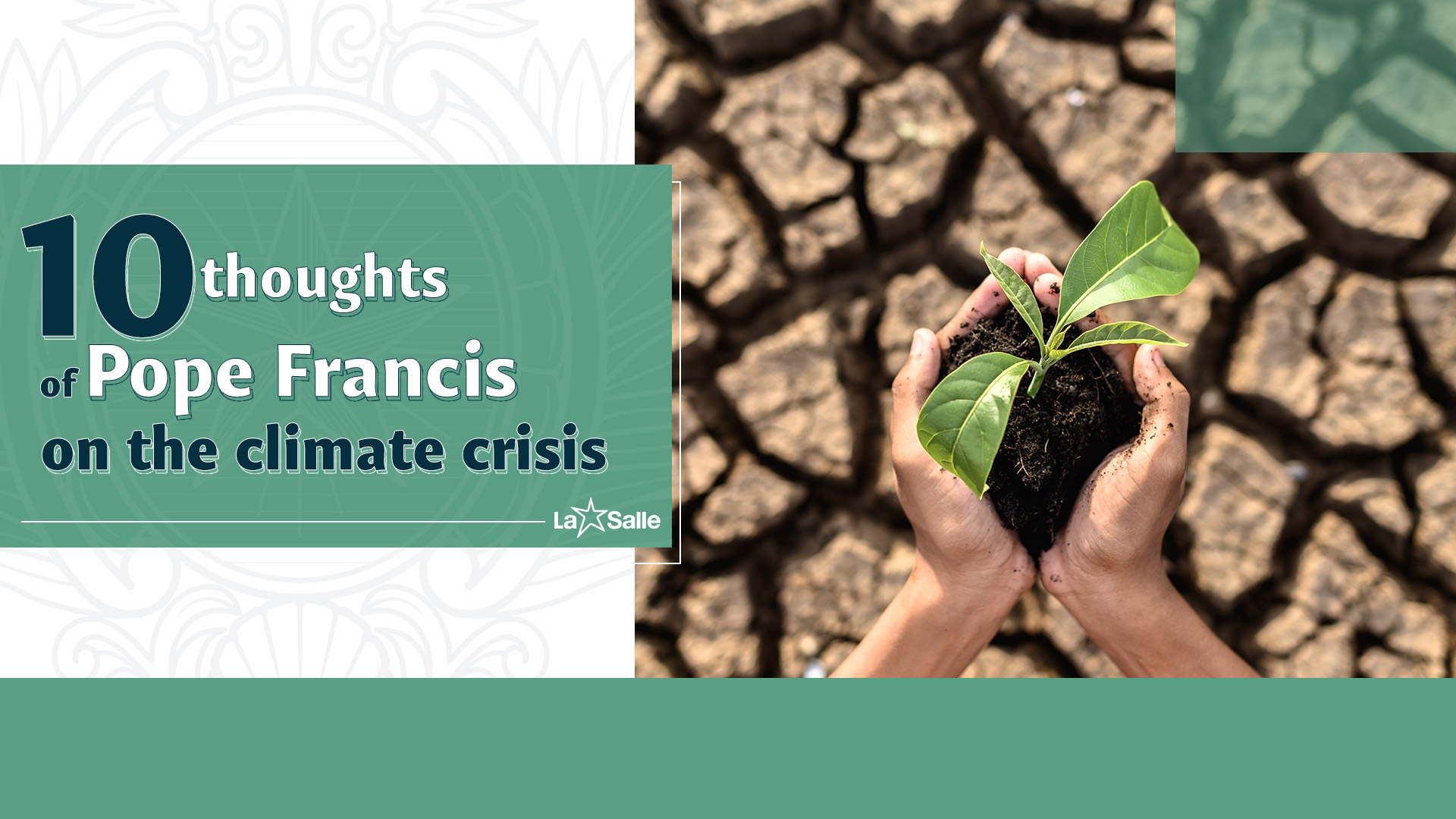Pope Francis’ concern for the care of our common home has resonated at the Conference of the Parties to the United Nations Framework Convention on Climate Change (COP28). Likewise, the Bishop of Rome has dedicated this year’s Apostolic Exhortation Laudate Deum – published on 4 October – to the climate crisis.
The Pope’s teachings on climate change are a source of inspiration for Lasallian educators in their commitment to integral ecology and care for our common home. Here we are ten key reflections:
- “It is indubitable that the impact of climate change will increasingly prejudice the lives and families of many persons. We will feel its effects in the areas of healthcare, sources of employment, access to resources, housing, forced migrations, etc. (LD 2). This is a global social issue and one intimately related to the dignity of human life” (LD 3).
- “Despite all attempts to deny, conceal, gloss over or relativize the issue, the signs of climate change are here and increasingly evident. No one can ignore the fact that in recent years we have witnessed extreme weather phenomena, frequent periods of unusual heat, drought and other cries of protest on the part of the earth that are only a few palpable expressions of a silent disease that affects everyone” (LD 5).
- “Lack of information leads to confusion between large-scale climate projections that involve long periods of time – we are talking about decades at least – with weather forecasts that at most can cover a few weeks. When we speak of climate change, we are referring to a global reality – and constant local variations – that persists for several decades” (LD 8).
- “It is no longer possible to doubt the human – “anthropic” – origin of climate change. Let us see why. The concentration of greenhouse gases in the atmosphere, which causes global warming, was stable until the nineteenth century, below 300 parts per million in volume. But in the middle of that century, in conjunction with industrial development, emissions began to increase (…) until arriving at 423 parts per million in June 2023. More than 42% of total net emissions since the year 1850 were produced after 1990″ (LD 11).
- “Regrettably, the climate crisis is not exactly a matter that interests the great economic powers, whose concern is with the greatest profit possible at minimal cost and in the shortest amount of time” (LD 13).
- “A broader perspective is urgently needed, one that can enable us to esteem the marvels of progress, but also to pay serious attention to other effects that were probably unimaginable a century ago. What is being asked of us is nothing other than a certain responsibility for the legacy we will leave behind, once we pass from this world.” (LD 18) “What happens in one part of the world has repercussions on the entire planet. This allows me to reiterate two convictions that I repeat over and over again: “Everything is connected” and “No one is saved alone” ” (LD 19).
- “We must move beyond the mentality of appearing to be concerned but not having the courage needed to produce substantial changes. We know that at this pace in just a few years we will surpass the maximum recommended limit of 1.5° C and shortly thereafter even reach 3° C, with a high risk of arriving at a critical point” (LD 56).
- “I ask everyone to accompany this pilgrimage of reconciliation with the world that is our home and to help make it more beautiful, because that commitment has to do with our personal dignity and highest values. At the same time, I cannot deny that it is necessary to be honest and recognize that the most effective solutions will not come from individual efforts alone, but above all from major political decisions on the national and international level” (LD 69).
- “It is up to this generation to heed the cry of peoples, the young and children, and to lay the foundations of a new multilateralism. Why not begin precisely from our common home? Climate change signals the need forpolitical change. Let us emerge from the narrowness of self-interest and nationalism; these are approaches belonging to the past. Let us join in embracing an alternative vision: this will help to bring about an ecological conversion, for “there are no lasting changes without cultural changes.”” (Pope Francis, Address to COP28).
- “You are responsible for crafting policies that can provide concrete and cohesive responses, and in this way demonstrate the nobility of your role and the dignity of the service that you carry out. In the end, the purpose of power is to serve. It is useless to cling to an authority that will one day be remembered for its inability to take action when it was urgent and necessary to do so (…). Let us leave behind our divisions and unite our forces! And with God’s help, let us emerge from the dark night of wars and environmental devastation in order to turn our common future into the dawn of a new and radiant day” (Pope Francis, Address to COP28).



